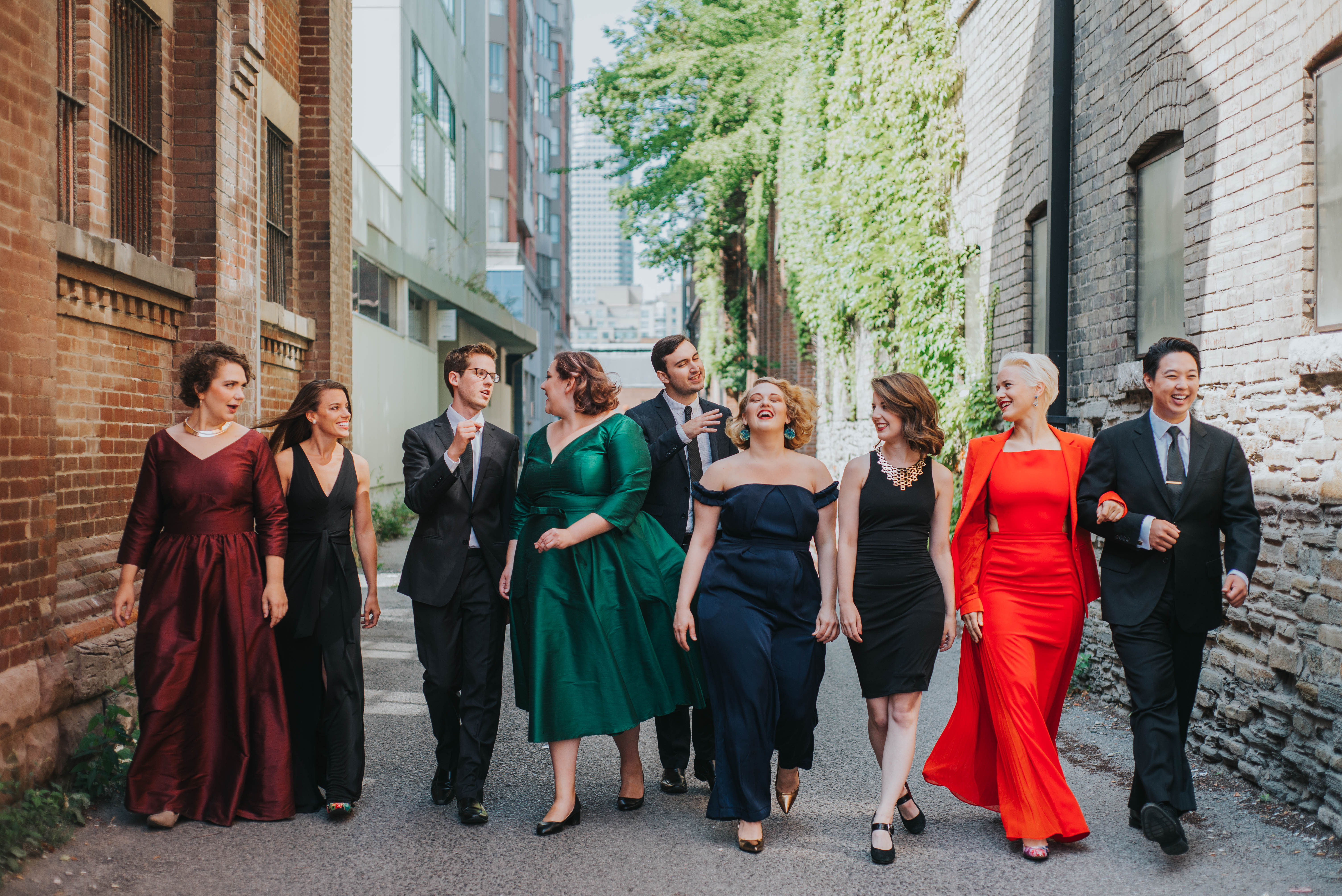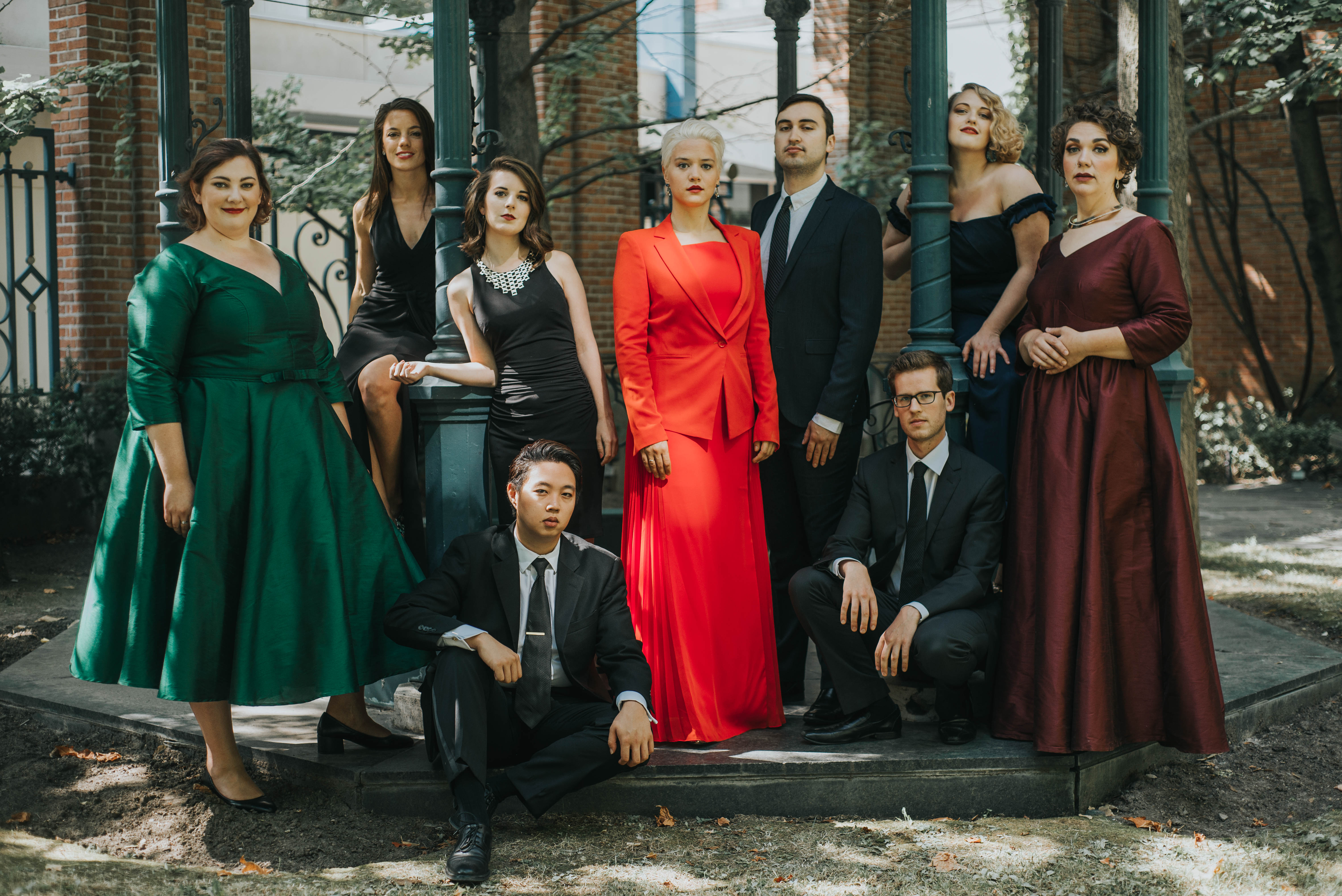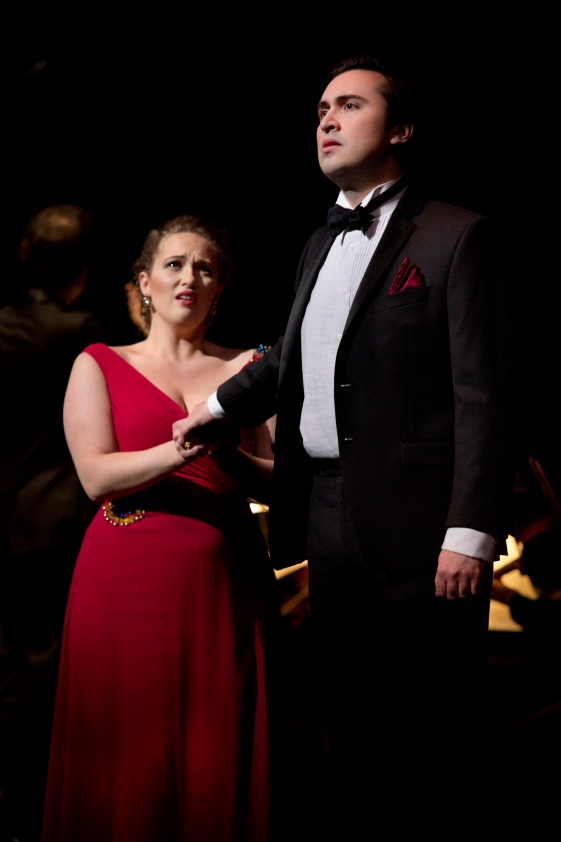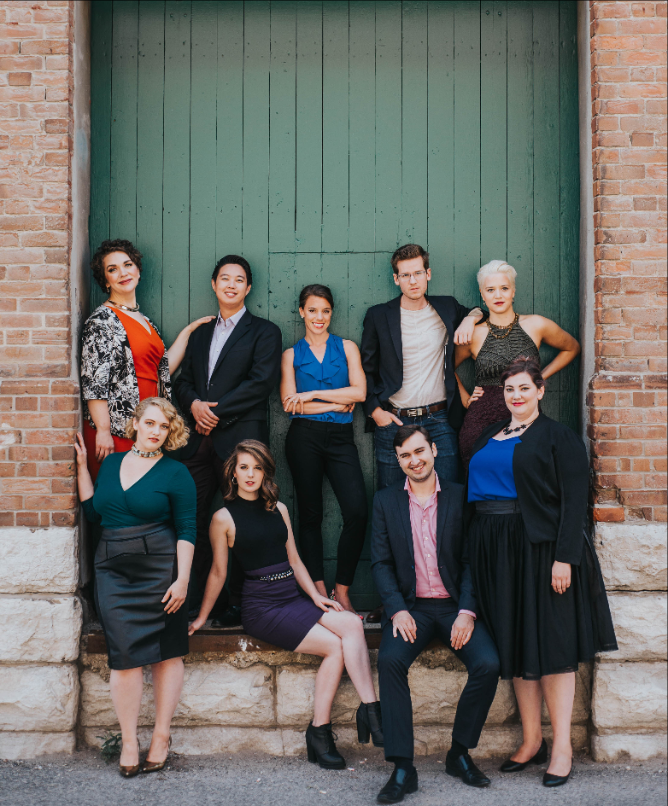-
Artist Q&A: An Evening with the Ensemble Studio
By COC StaffPosted in COC Staff
On May 25, the COC Ensemble Studio takes over the mainstage of the Four Seasons Centre for the Performing Arts for An Evening with the Ensemble Studio. Some of Canada’s most talented young artists perform highlights from Mozart’s wry comedy Così fan tutte and Purcell’s full supernatural epic Dido and Aeneas.We checked in with all nine Ensemble Studio members ahead of the event to find out what audiences can expect from this highly anticipated showcase.
What are you most excited about with this program?
Danika Lorèn, soprano: Ensemble singing! It is far too rare that we actually get to sing with each other during the year, and the ensemble singing specifically in Dido will be a real treat to put together.
Rachael Kerr, pianist/intern coach: I’ve done Così fan tutte a few times and it’s such a fun opera. I was looking forward to re-visiting a piece that holds such good memories for me. For the Purcell, I knew we would get a chance to have “duelling harpsichords” in the orchestra, so Stéphane [Mayer] and I were excited about that!
Simone McIntosh, mezzo-soprano: Mozart is one of my favorite composers, and singing his music makes me feel whole. As someone who grew up singing in choirs I leap at the chance to perform in ensembles as a solo singer, which we will be doing quite a bit of for this show.
Bruno Roy, baritone: For me, Dido and Aeneas is what I was most excited about. It is a style I am unfamiliar with and this will be my first time stepping into the shoes of a heroic character—Aeneas, the founder of Rome! All of it is quite new to me, but I am definitely thrilled and looking forward to it.
What stands out to you about what is required on a performance-level at this year’s showcase?
Rachael: For the singers, they must sing not only their role in Dido and Aeneas, but also chorus parts. They must shift character quickly, and gracefully transition from soloist to ensemble member.
Samuel Chan, baritone: This year’s showcase has two pieces that are great examples of operatic vocal chamber music. The way the vocal lines align with the orchestra is very intimate in both pieces, and we spent many hours working amongst ourselves and with our musical team to bring out the unique characteristics of chamber performance.
In the Mozart, all the characters have moments where we sing our vocal lines at the same time, so we all have to work on expressing our individual characters' perspectives while advancing the overall plot. In the Purcell, we're working a large chunk of the show with continuo orchestration, which means the singers are almost exclusively accompanied by solo harpsichord and solo cello. Therefore, we have to work out a collective agreement on tempo, harmonic language, rhythm, and expression closely with the instruments/conductor, to keep the drama and the music moving together.
Lauren Eberwein, soprano: It’s a dark journey for Dido. She is in a really scary, tumultuous place, and ultimately takes her own life. It’s a dangerous and difficult mind set to unleash as an actress. [N.B. Eberwein sings the role of Dido to Roy’s Aeneas].
Danika: In addition to performing, we are actively involved in many of the design elements of the show. Many of us like to sew and design our own performance looks, and being fully responsible for the designs of our characters is a really cool way of exploring their personalities. It will be a true showcase of the multi-talented performers that we have become here.
 Artists of the COC Ensemble Studio for 2017/2018: (l-r) mezzo-soprano Megan Quick, pianist/intern coach Rachael Kerr, mezzo-soprano Simone McIntosh, baritone Samuel Chan, soprano Lauren Eberwein, baritone Bruno Roy, pianist/intern coach Stéphane Mayer, soprano Danika Lorèn and soprano Samantha Pickett.
Artists of the COC Ensemble Studio for 2017/2018: (l-r) mezzo-soprano Megan Quick, pianist/intern coach Rachael Kerr, mezzo-soprano Simone McIntosh, baritone Samuel Chan, soprano Lauren Eberwein, baritone Bruno Roy, pianist/intern coach Stéphane Mayer, soprano Danika Lorèn and soprano Samantha Pickett.When you’re performing, from the audience’s perspective, you all look completely transported. What are you really thinking about?
Bruno: When onstage I'm often thinking, “What’s next?” It’s an easy question and the answer is sometimes “Move here, when the moment comes,” or “Sing this,” but also it’s a way for me to stay active within the scene. If I ask myself, “What’s next?” in regards to what my character would think upon hearing news for the first time, it creates a more authentic dramatic reaction than any planned motion or action I could make.
Megan: I’m really thinking about the story. For me that’s what it's all about. Being so sure of what I'm trying to say and the story I'm telling, that the audience has no choice but to come with me—with us—on this journey.
Samuel: During performances, I’m mentally transporting myself to the perspective of the character I’m playing, and using the music to justify the reasons behind my character’s choices within the plot. I often find myself imagining the scenario and “living it out” on the stage, given a reason to what I have to say through the text and the music.
Lauren: Hopefully, if I’ve done my work and am trusting myself that night, I can be present and live the character’s journey. Of course, as singers, we’re always in touch with our technique, thinking about anything from tongue tension, to breath support, to language, to dramatic intention...there’s a lot bouncing around in our minds on any given night.
Stéphane: I’m trying to respond to and support my colleagues on stage. Seeing as I generate the majority of the music from the harpsichord, I’m always aware of the text and try to create the proper sound “landscape” to underpin the emotion being played at the moment.
Samantha: Opera is a balancing act of investing in the moment on stage and with the music, and being aware of any technical issues that require some extra brain power. I’m most aware of my breathing. For me, breath is the most fundamental character expression. It grounds the singing, and feeds the interpretation. It can completely change your body (for better or worse!).
 Danika Lorèn and Bruno Roy performing during An Evening with the Ensemble Studio, 2017, photo: Bronwen Sharp.
Danika Lorèn and Bruno Roy performing during An Evening with the Ensemble Studio, 2017, photo: Bronwen Sharp.What are some lessons you’ll take with you from your time in the Ensemble Studio?
Bruno: During my time in the studio I've learned many lessons: how to pace myself, how to handle the load of many projects at once, when to give it your all and also when to take a step back. One of the lessons I will take with me is simple: trust my artistry. As young singers we are often eager to please and are comfortable taking in feedback and advice. Discovering our own critical voice and making strong, informed choices as artists is what will guarantee growth and longevity when we leave the Ensemble Studio.
Danika: The challenges of this program have taught me the power of persevering through my own doubts. Difficult music, tight timelines and world-class colleagues can all be very intimidating! But it doesn’t matter where you come from or who you think you are… if you stay focused and come prepared you will be fine.
How has the Ensemble Studio experience has changed you as an opera singer?
Bruno: One of the major things that has changed is how I view the process of producing an opera. Watching, listening, and learning from some of the principal artists on the various productions I have been involved in has inspired and informed me more than I would have thought. I've been witness to the importance of patience and pacing; it definitely has changed the way I now approach a performance of my own. It simply amazes me how quickly and wonderfully people come together to create an opera. There's also nothing that quite compares to the experience of standing close to one of the principal artists as they create a sound or high note powerful or subtle enough to evoke an emotion that translates to every person in the opera house.
Danika: This experience has changed my outlook on singing technique and physical fitness. Before I came here, I thought that thoughtful story-telling was my only responsibility as a singer, but performing on the Four Seasons Centre stage has shown me the importance of the balance of artistry and athleticism in opera.
 Artists of the COC Ensemble Studio for 2017/2018: (top row, l-r) Soprano Samantha Pickett, baritone Samuel Chan, pianist/intern coach Rachael Kerr, pianist/intern coach Stéphane Mayer and soprano Lauren Eberwein; (bottom row, l-r) soprano Danika Lorèn, mezzo-soprano Simone McIntosh, baritone Bruno Roy and mezzo-soprano Megan Quick.
Artists of the COC Ensemble Studio for 2017/2018: (top row, l-r) Soprano Samantha Pickett, baritone Samuel Chan, pianist/intern coach Rachael Kerr, pianist/intern coach Stéphane Mayer and soprano Lauren Eberwein; (bottom row, l-r) soprano Danika Lorèn, mezzo-soprano Simone McIntosh, baritone Bruno Roy and mezzo-soprano Megan Quick.What do you want audience members to take away from the performance on May 25?
Stéphane: I want them to be transported by the words and the music. It is such a gem of the operatic repertoire. It tells a timeless tale that still resonates with us all today. The music is incredible, daring and modern even to our ears. If we do our jobs right, we will be able to let the music and words speak for themselves, and that should be enough to transport even the toughest of audience members into another world.
Lauren: That opera is a relevant and youthful art form. I want to communicate and share true and pure emotion.
Rachael: I hope they feel some of the fun that comes along with the selections from Così, and for Dido, I think everyone can relate to feeling love for someone who seems destined not to work out. It's a universal narrative.
Samuel: I hope the audience can enjoy not only the beautiful music, but why these pieces still matter to the present day. I believe one of our collective goals as an ensemble is to show why this music is relevant to us now, and how our interpretation can be honest and true to our modern day perspectives.
Danika: Aside from the display of our talents, I hope people take away the love that we have for each other as an ensemble. It will be a real joy for us to be together on that stage and I hope that translates above all.
All tickets to An Evening with the Ensemble Studio are $35.An Evening with the Ensemble Studio takes place on May 25, 2018 at the Four Seasons Centre for the Performing Arts.
Joining the performance as a special guest artist is Ensemble Studio graduate, tenor Andrew Haji, who rounds out the cast as Ferrando in scenes from Così fan tutte. Singers will be accompanied by the acclaimed COC Orchestra, led by COC Music Director Johannes Debus, with Ensemble Studio intern coaches and pianists Rachael Kerr and Stéphane Mayer each playing the harpsichord.
Take your culture game to the next level with our monthly eOpera newsletter.
